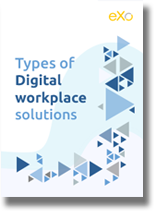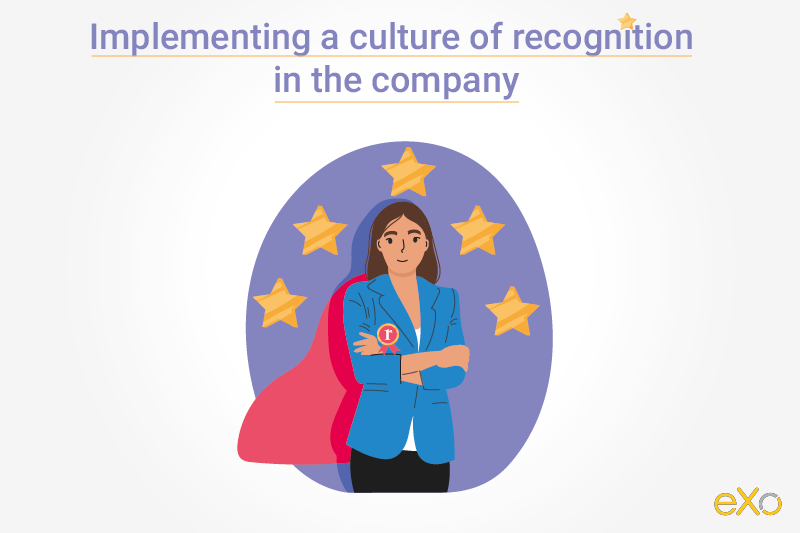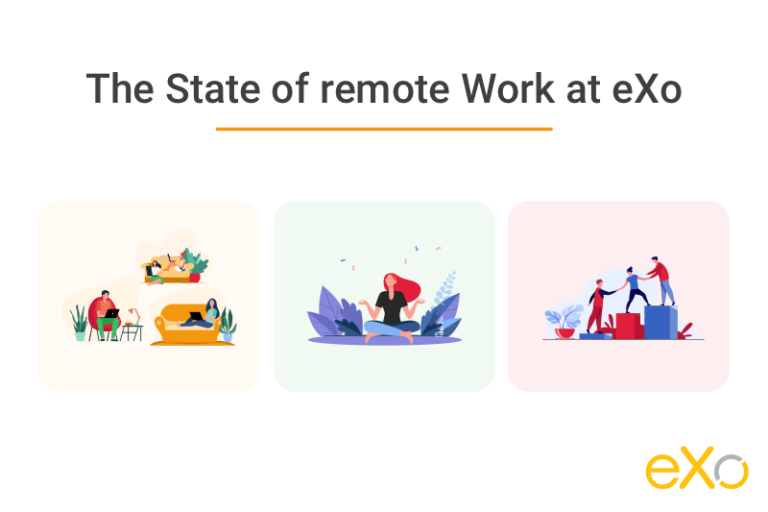- Anne-Sophie Duport
- September 21, 2022
8 ways to boost your employee engagement
One would think it no longer necessary to demonstrate the positive impact of employee engagement on company performance, on brand development or on talent retention. However, the latest Gallup study shows that is not the case. Indeed, many companies are not yet aware of employee engagement importance or have not yet taken the necessary actions to improve it.

Content
1. What is employee engagement?
Let’s start by defining employee engagement:
Employee engagement is the willingness of an employee to help his company even outside of their immediate job scope, to go the extra mile.
Below we assemble 8 tips that can help you take action and make your employees feel more engaged and motivated, Find them at the end of this article in the form of an infographic to keep them in mind
2. What are the engagement levers?
Have you ever heard the phrase “employees don’t leave their company, they leave their manager”? Some bad managers do indeed cause good employees to send their 30 day resignation letter. According to a Gallup study, 50% of employees who quit cited relationship problems with their boss as the main reason for their departure.
Today, an authoritarian leader, ruling with an iron fist, is definitely a thing of the past. Listening is essential for an efficient and legitimate management. Managers who take into account the needs and the ideas of their teams are more appreciated and produce better results. Moreover, when you use hiring platforms like Upwork or even Upwork competitors such as Hire Digital, make sure to state your company culture in any job postings you make.
For a win-win approach, managers must involve their employees and take their proposals into account. At the organization level, it helps enforcing a more level management structure. Also, concern about the security of their data can show your involvement. In this case, using a password manager and powerful vulnerability scanning tools to ensure your online properties are safe would be the best solution. And it will attract even more talented employees.
One of the most important factors in increasing employee engagement is the quality of relationships your employees build between themselves.
Organizing team building events allows people to get to know each other, to understand each other’s character and behavior and encourages informal exchanges. This creates a positive dynamic that promotes cohesion and team spirit. Employees have a positive state of mind at work.
In a nutshell, team building is important. Even more so, if you put in place remote work policies.

FREE WHITE PAPER
Types of Digital workplace solutions
The modern workplace has evolved significantly in recent years, with advancements in technology, the growing number of tools …
Think about employee recognition
Recognition at work is a key element to engage and motivate your employees. Indeed, according to a survey conducted by Moodwork for My Happy Job in January 2022, 58% of respondents feel they receive recognition from their colleagues. This trend is stronger for men (67.9%) than for women (55.9%). This percentage increases slightly for recognition from managers (61%).
Incredibly, on the other hand, only 26% of respondents say they receive recognition from their company!
Recognition at work improves employees’ confidence in their ability to act. It makes them feel useful and gives meaning to their work. In addition, recognition reinforces the feeling of belonging to the group because it creates individual and collective attachment of employees to their company.
Recognition and the feeling of belonging are thus two levers for retaining employees, if they feel happy and recognized, they do not want to look elsewhere. This positive effect even influences customers’ feelings. This is what we call “the symmetry of attention”. An employee can only have a lasting relationship with his customers if he himself has been the object of such attention internally. Thus, happy employees lead to satisfied customers.
Recognition also boosts company’s performance. Employees have confidence in themselves, feel useful and appreciated by their hierarchy and colleagues, which favors and improves their engagement and motivation at work. They reach their objectives quicker and drive the company’s performance. A great solution is sending SMS reminders to your employees, reminding them that you value and appreciate their hard work.
You can also create a personalized video using an online video editor, it will be more meaningful and personal. In addition, you can use this opportunity to express good work appreciation for their efforts and how much the company values them. This will not only make them feel special but also help team members bond with one another and build stronger relationships. Alternatively, you can use an employee engagement software to create loyalty programs and rewards, consistent communication, and automatic recognition of their contributions. This will not only make them feel special but also help team members bond with one another and build stronger relationships.
Of course the ultimate form of employee recognition comes in the form of a raise or offering benefits such as health insurance, retirement savings accounts, or even tuition reimbursement if they’re furthering education and opted for a graduate student loan. Handling salary and benefits changes can be tricky, but since OnPay makes gross pay calculations a breeze, you don’t have to put this off thanks to modern software.
Express meaning for work in your organization
According to a DARES study published in May 2021, 30% of French employees consider their work useless. Among them, 8% believe that their professional missions lack meaning and quality and 11% even declare that they are forced to perform professional tasks that they disapprove of, creating conflicts of values.
Having a meaningful job is a must today and is even a prerequisite for the younger generations.
But how can you give that meaning to work? First of all, you have to indicate the direction your company is taking and the operational impacts that result from it. It is also necessary to be transparent and honest about the company’s values as soon as you recruit an employee.
Finally, it is necessary to discuss with the candidate to ensure that the proposed mission is of interest to him/her. Indeed, most of the time, the meaning results simply from being on the same wavelength. Not everybody saves the world, but every job carries meaning.
Platfrom
Boost your collective intelligence
Make well-being and work/life balance your priority
Did you know that Randstad’s 2021 Workmonitor study found that 56% of employees (surveyed in more than 30 countries) said they were concerned about real “work-life imbalances”?
Why not learn from the health crisis and create a new work environment, in line with employees’ expectations? That would lead to more commitment and well-being at work and therefore to better productivity?
With the health crisis, many employees realized that autonomy in the management of their work time was essential for their quality of life. Implementing a few days of remote work per week may offer a desired work-life balance for some of your employees. Indeed, it would allow them to avoid transportation and the related stress, to work quietly and efficiently on projects that require concentration and to organize themselves independently without being interrupted by a colleague.
According to a study by Great Place To Work, companies where it is good to work perform well, even in times of crisis, because they trust their employees, which pushes them to be more creative and productive in face of the difficulties.
Allow more flexibility and autonomy
Allowing more flexibility and autonomy improves employee engagement, while imposing fixed schedules prevents them from exercising autonomy and leads to the opposite result. It does not really matter how your people organize their time as long as the mission is accomplished and the result achieved.
Trust your employees and let them take the initiative. An engaged employee is first and foremost a person who is free to act.
Invest in skills development and training
Investing in training and skills development focuses one of the employees basic needs. Training is directly linked to the desire to progress and develop skills. Employees learn new concepts, acquire new skills and validate their knowledge. As a consequence, they feel valued and confident, and are more at ease in carrying out their mission. Taking into account the needs of employees by the company also helps develop their sense of belonging and therefore boosts their engagement.
In fact, according to the Gallup Institute study, 92% of employees believe that the overall level of commitment is high in companies where training is a focus point. On the contrary, only 66% of employees believe that the overall level of commitment is high in companies with no special attention to training.
Training is an essential lever for encouraging commitment. 93% of employees whose company has set up continuous training consider that it has a very strong impact on their engagement and motivation. Not limited to formal training, other informal skills like website creation and development could also be an option to raise their engagement. Furthermore, equipping employees with language proficiency such as teaching them the fundamental elements of Spanish could improve communication in international business relations. You could even set up your own elearning system to create, distribute and track your own employee training materials.
Conclusion:
Armed with the above tips, you are now ready to start working on your teams commitment level! Let us know what you think or if you have other ideas as to how to drive employee engagement.
tools and information
You will find here Frequently Asked Questions about employee engagement with all the answers in one place.
What is employee engagement?
It’s the willingness of an employee to help his company progress. It is a positive behavior, which manifests itself by a strong involvement in his work and by a great motivation. This allows the company to evolve both in terms of its activity and on a human level.
How to Improve Employee Engagement in the Workplace?
- Ensure a strong corporate culture
- Ensure good relationship with management
- Foster good relationships between the colleagues
- Think about employee recognition
- Express meaning for work in your organization
- Make well-being and work/life balance your priority
- Allow more flexibility and autonomy
- Invest in skills development and training
➝ Find out how to improve employee engagement in the workplace
Related posts
- All
- eXo
- Digital workplace
- Employee engagement
- Open source
- Future of work
- Internal communication
- Collaboration
- News
- intranet
- workplace
- Knowledge management
- Employee experience
- Employee productivity
- onboarding
- Employee recognition
- Change management
- Cartoon
- Digital transformation
- Infographic
- Remote work
- Industry trends
- Product News
- Thought leadership
- Tips & Tricks
- Tutorial
- Uncategorized
Leave a Reply
( Your e-mail address will not be published)


